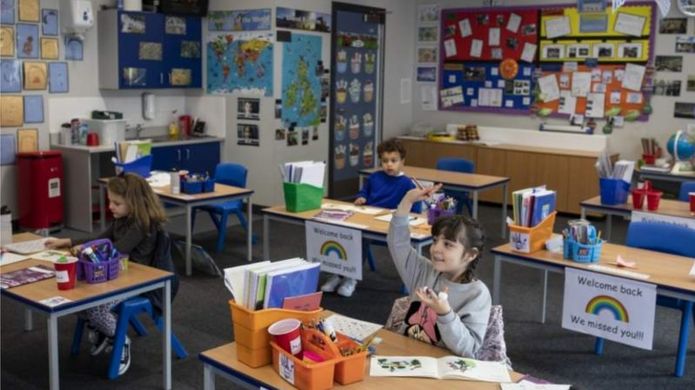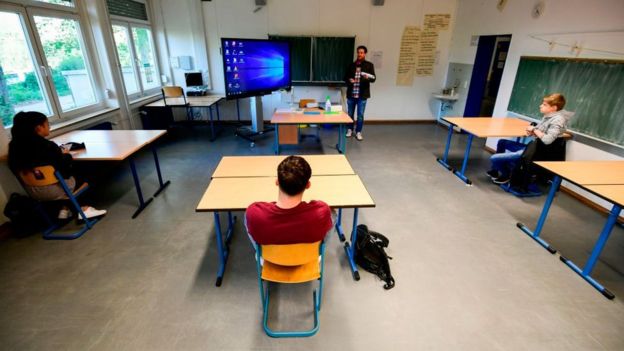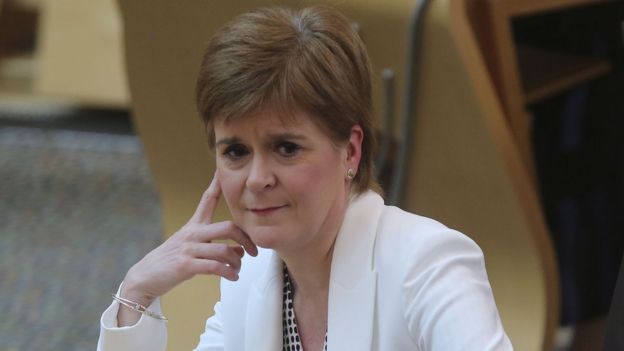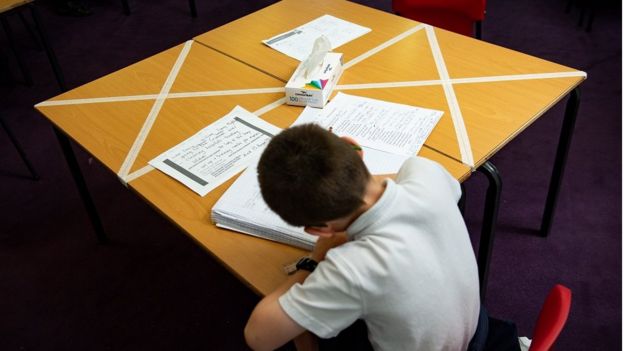Education, Education, Education

The Daily Record reports that largest teaching union, the EIS, is unhappy with the Scottish Government's abrupt U-turn on full-time schooling and reveals that this new 'Plan B' was not even discussed, never mind agreed, at a special Covid Education Recovery Group (CERG).
Meanwhile the Scottish Parent Teacher Council (SPTC) welcomed the move and says that 'parent power' forced the government to change course:
“Parents’ outrage at the Blended Learning proposal as the only plan has led to this huge change of heart.”
Meanwhile Glasgow City Council hedged its bets by saying the council backs the plan for a full-time return, but has a contingency for part-time blended learning if necessary.
I wonder when the Glasgow's education committee will start meeting again and whether the council might publish its contingency plans for part-time, 'blended' learning?
Trade union leader says full time school plan "not agreed" by Government education group
Larry Flanagan also criticised the idea of no physical distancing between pupils
By Paul Hutcheon - Daily Record
Larry Flanagan, general secretary of the EIS, said Education Secretary John Swinney had instead made a “political announcement”.
Swinney, as chair of the Government’s Covid Education Recovery Group (CERG), recently announced the government’s plan for schools to go back on August 11th.
However, his initial blueprint was for a ‘blended’ learning model under which face to face teaching in classrooms would be part time.
This was to have been made necessary because of the two metre social distancing rule.
The proposals caused uproar among parents and Swinney provided an urgent “update” to MSPs at Holyrood yesterday.
In his statement, Swinney said the progress made in suppressing the virus meant preparations should be made for full-time schooling.
He also said other countries were reviewing social distancing and the two metre rule is being re-examined north of the border.
Swinney also said blended learning was now merely a “contingency”. Tory MSP Jamie Greene described the announcement as a "u-turn".
In his own statement on the EIS website, Flanagan, who is a member of the ERG, hit out at Swinney’s change of heart and claimed it had caused “anxiety, frustration, confusion and even anger” among teachers.
He wrote: “It is worth making clear that this was a political announcement from the Scottish Government – not an agreed outcome from CERG (Covid Education Recovery Group) which met only last week and discussed support for blended learning.”
“That is certainly a shift in planning emphasis from the Scottish Government. Essentially it is a "Maybes Aye; Maybes Naw" scenario, as ultimately the decision is dependent on where the level of Covid 19 infection will be in seven weeks time.”
Flanagan said the EIS “red-lines” for a return to school include “demonstrable evidence” the virus is under control.
He added: “Our second red-line also continues to be applicable – that mitigations are in place to enable the implementation of public health guidance within schools.
“The EIS is not convinced that no physical distancing between pupils is safe and we are absolutely certain that physical distancing between pupils and teachers remains essential.
“It may be that the actual distance, come August, will have been reduced from the current 2 metres if the level of infection has dropped further, but there cannot be a social distancing rule for outside of schools and a different one for inside classrooms.”
He concluded: "We need to be absolutely clear that it would be a fundamental error on the part of the Scottish Government, our employers, parents, or indeed anyone, to believe that Covid 19 will have gone away in August and that it will be business as usual for schools. It will not be.
“If that is a politically inconvenient truth for anyone, it nonetheless remains a truth.”
Parent Power Forces U-Turn (23/06/20)
The schools plan wasn't so much blended as half-baked. Now it's been been binned. This also suggests Nicola Sturgeon intends to follow Boris Johnson in lifting lockdown very soon, whatever she says now. Full time learning is impossible with 2 metre rule. heraldscotland.com/news/18536075.…
157 people are talking about this
The Herald's Iain Macwhirter responds to the welcome U-turn on 'blended learning' which was announced earlier today by the Scottish Government.
Just goes to show that people who criticise government policy, both local and national, often have a good point.
Parent Power Forces U-Turn (21/06/20)

BBC Scotland's Glenn Campbell reports that parent power has forced the Scottish Government to rethink its plans for a new system of 'blended' or part-time learning when schools return on 11 August.
https://www.bbc.co.uk/news/uk-scotland-scotland-politics-53111180
Coronavirus: Parent power changes Scottish school return plans
By Glenn Campbell - BBC Scotland
 Image copyright - GETTY IMAGES
Image copyright - GETTY IMAGESThe next time someone tells me politics doesn't matter, I'm going to remind them about the debate over schooling this week.
Parent power, backed up by political campaigning, has produced a significant shift in Scottish government thinking.
Last Sunday, the part-time return of Scottish schools on 11 August, with children doing additional work at home appeared to be the default position.
Within a few days, the first minister described this "blended learning" approach as a "contingency" and said she'd move heaven and earth to reopen Scotland, especially schools.
In effect, the default became the back up plan.
Expectations raised
In the middle of a pandemic, Nicola Sturgeon cannot and has not guaranteed schools will be back 100% after the summer holidays and that there will be no remote learning.
But it seems to me, that outcome - or something close to it - is now the goal. Expectations have been raised.
Achieving that would first of all require a continued suppression of coronavirus, towards which good progress is being made in Scotland.
 Image copyright - GETTY IMAGES
Image copyright - GETTY IMAGESIt would also require a change to the 2m (6ft) rule on social distancing.
The rule has already been reduced to 1m (3ft) for pupils in Northern Ireland and the Scottish government has asked for fresh advice from its experts within two weeks.
Getting children back full time in August would also need acceptance from parents, teachers and their representatives.
The powerful EIS teachers' union, for instance, has made clear it will not compromise on safety and wants more teachers recruited.
32 separate plans
At this point, it's worth remembering that the delivery of school education is a local authority function. Councils need to be on board too.
As they have been developing 32 separate plans for blended learning, it has become clear that wide variation in classroom provision could result.
There was an outcry when it emerged Edinburgh's offer could include as little as one day a week in school for pupils, whereas other councils were aiming for two or more classroom days.
 Image copyright - EPA
Image copyright - EPAThe first minister made clear one day a week would not be acceptable and promised to scrutinise council plans closely and consider setting minimum requirements.
She knows that the political reality is that if councils are perceived to under provide, the Scottish government will get at least some of the blame.
One way for ministers to avoid that and lots of wrangling with councils, is to strive to create conditions that minimise the need for blended earning.
As the first minister said at her coronavirus briefing on Friday: "If we can get to a point where we don't need it at all, of course we'd prefer that".
That preference or aspiration has still to be turned into a firm policy commitment and Nicola Sturgeon's political opponents will keep pressing her for that.
 Image copyright - PA MEDIA Image caption - The first minister has said she will "move heaven and earth" to get schools open again
Image copyright - PA MEDIA Image caption - The first minister has said she will "move heaven and earth" to get schools open againThe decision by the UK government to target the full return of schools in England in September adds an extra dimension to the debate.
If anything like a full return in August is achieved, it may have knock-on effects for the broader easing of lockdown, with some other restrictions lasting longer.
Many would regard that as a price worth paying for the resumption of a more normal system of education and the chance to get back to work.
Others may require greater reassurance that arrangements are safe and any coronavirus cases in schools can be effectively contained.
But those who have raised their voices to argue for an improvement to the "blended learning" models that were emerging have changed the debate.
Political action, in this case, has mattered and it has made a difference.




